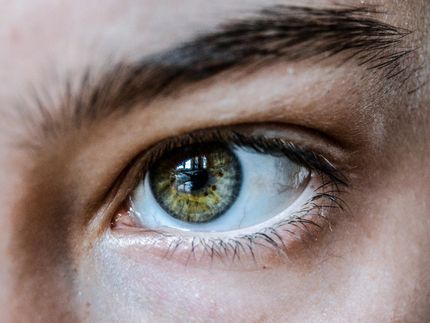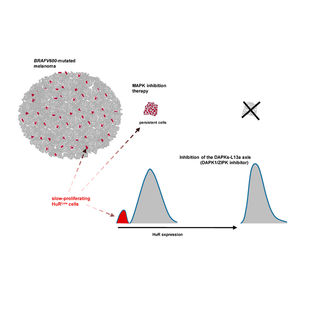1 million euro FFG funding to boost structural biology research
Laura Bassi Centre of Excellence” of Kristina Djinovic-Carugo extended for another three years
Advertisement
The Austrian Research Promotion Agency (FFG) extended the contract with the Center for Optimized Structural Studies (COSS) at the Max F. Perutz Laboratories and the University of Vienna. The COSS is one of only eight centres funded through the “Laura Bassi Centre of Excellence” program. Over the next three years – until 2016 – structural biologist Kristina Djinovic-Carugo and the COSS team will be funded with 1 million euro to do research at the interface between science and industry.
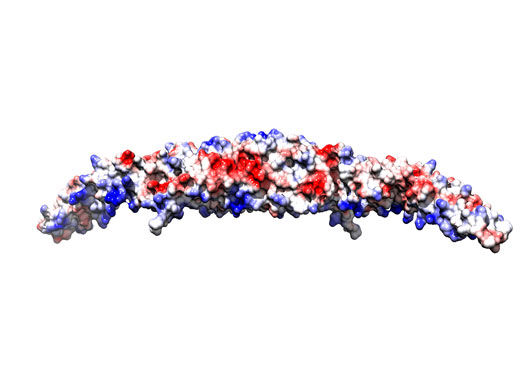
Molecular surface of Pacsin 2, a protein involved in membrane sculpting, colored by its electrostatic potential (red representing negative charges and blue representing positive charges).
Kristina Djinovic-Carugo
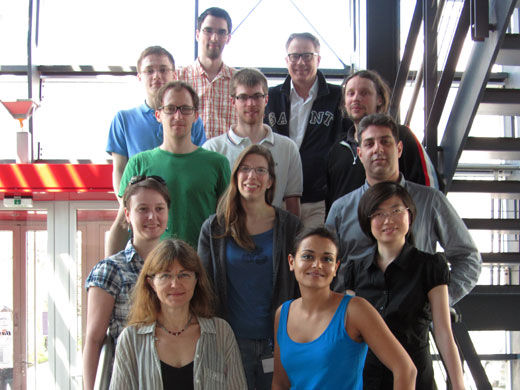
Kristina Djinovic-Carugo (bottom left) and her team at the Center for Optimized Structural Studies (COSS), who have successfully extended their funding as a “Laura Bassi Centre of Excellence”, boosting structural research in Vienna with 1 million euro until 2016.
Georg Mlynek
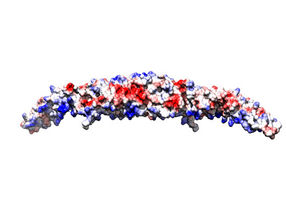
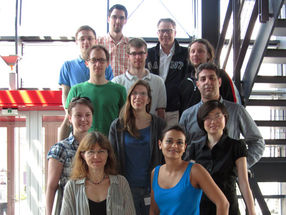
The Center for Optimized Structural Studies (COSS) at the Max F. Perutz Laboratories (MFPL) of the University of Vienna and the Medical University of Vienna is one of only eight projects funded since 2009 through the “Laura Bassi Centre of Excellence” initiative. This program of the Austrian Research Promotion Agency FFG promotes research networks led by women at the interface between science and industry.
The funds – announced by the FFG – will allow the COSS team to continue its highly successful work for another three years. “The University of Vienna is delighted that this application-oriented research project got such a positive evaluation, receiving a total of 2.3 million euro of federal funding, and that it will be continued for another three years,” says Heinz W Engl, rector of the University of Vienna.
Innovative methods to produce large quantities of protein
The researchers work on the development of new and innovative methods to produce proteins suitable for structural and biochemical analyses. Such structural studies require large amounts of high-quality and functionally active protein, the production of which can be a complicated process that varies for different proteins. However, knowing the structure of proteins is critical for understanding how they carry out their diverse functions in living cells and can also help to understand their role in the development of disease.
The COSS center is a partnership between the MFPL, the University of Vienna and the Campus Science Support Facilities GmbH as scientific partners on the one side, and the Research Institute for Molecular Pathology (IMP), Intercell AG and BIOMIN Holding GmbH as industrial partners on the other side. The FFG “Laura Bassi Centre of Expertise” initiative covers 60 percent of the COSS centers funding, while the remaining 40 percent come from the science and industry partners.
“The extension of funding from the FFG is a result of the successful collaboration between our science and industry partners and is a recognition of the excellent quality of our research,” says Kristina Djinovic-Carugo, head of the COSS center and the Department of Structural and Computational Biology at the University of Vienna.
The “Laura Bassi Centre of Excellence” program encourages a new, modern way of research, which includes the development of professional as well as complementary skills. Visits to laboratories of collaborators, conferences and workshops are supported just as much as the participation in courses for leadership as well as time and project management skills.
“The knowledge we’ve developed in the COSS center has enhanced the productivity of the involved groups and given us a competitive edge, but we were also able to offer help to other groups of the Vienna Biocenter Campus. In the end of the second funding period we hope that COSS will offer a platform and the methodologies to complement and merge with the recently established Structural Biology Facility of the Biocenter Campus to maximize the benefit for all its researchers”, concludes Kristina Djinovic-Carugo.



